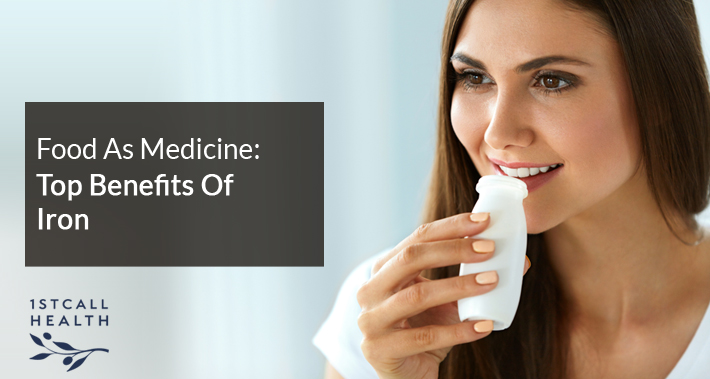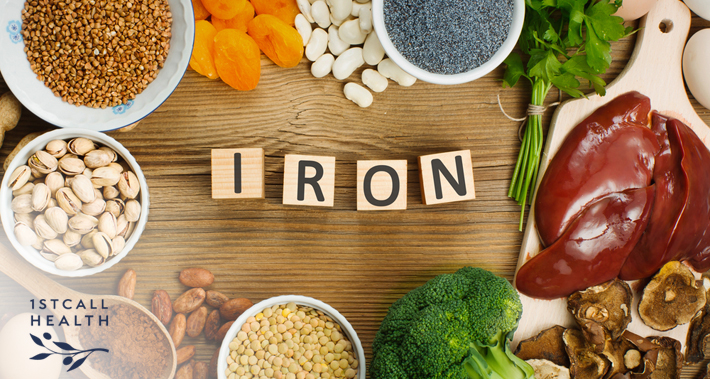
You might think of iron as something used in building and construction.
It’s a component of steel and an important part in engineering and used in reinforced concrete and alloys.
Or maybe it brings up images of “pumping iron” at the gym.
Perhaps a device used to get wrinkles out of clothing?
But it’s also an important component of your body, and specifically, your blood.
We’re a medical clinic in Washington DC with a focus on empowering you with the knowledge you need to keep yourself healthy and strong.
Today, let’s take some time to understand the role iron plays in your body, how to get enough in your diet, and what can happen if you don’t get enough (or too much).
Keep reading to find out more.
What Is Iron?
Iron is a mineral which your body needs to keep your blood healthy.
It’s an essential nutrient, which means your body can’t produce it on its own.
Instead, you get it through the food you eat, or supplementation.
The main function of iron in your body is to carry oxygen from your lungs to your bloodstream.
From there, it delivers oxygen to where it’s needed in your body.
There are two types of iron – heme iron and non heme iron.
Let’s take a closer look at the differences between them.
Heme Iron Vs. Non Heme Iron
Heme iron is only found in animal products such as meat, seafood, and poultry.
This type of iron is more easily absorbed by your body.
Although heme iron is only found in animal products, they also contain about 60% non heme iron.
Iron can also be found in some plant based foods.
However, these only contain non heme iron.
Some people have a condition called hemochromatosis which causes excess iron absorption from diet.
But for most people, it can be difficult to get enough iron through diet.
This is especially true if you’re eating a vegetarian or vegan diet.
Dietary Sources Of Iron
Sources of heme iron include:
- Beef
- Oysters, mussels, and clams
- Liver (chicken or beef)
- Venison
- Lamb chop
- Canned tuna
- Sardines (canned)
- Poultry
- Organ meat
- Eggs
Sources of non heme iron include:
- Seeds and nuts
- Beans
- Enriched bread and rice
- Tofu
- Dark chocolate
- Fortified cereals
- Spinach
- Lentils (cooked)
- Potato skins
- Cooked soybeans
- Chickpeas (cooked)
- Blackstrap molasses
What Does Iron Do?
Iron is a component of two important proteins in your body – hemoglobin and myoglobin.
Hemoglobin is part of your red blood cells and is used to carry oxygen from your lungs to the rest of your body.
Myoglobin, on the other hand, is used to store and carry oxygen in muscle tissue specifically.
It also plays an important role in the production of a variety of hormones and cells, including thyroid hormones.
It’s critical for healthy brain growth and development in children as well.
What Does Iron Deficiency Look Like?
Signs of iron deficiency may include:
- Poor concentration and confusion
- Pale skin due to lack of blood flow
- Frequent headaches
- Feeling faint and dizzy
- Panting, feeling breathless and winded
- Fast heartbeat
- Chronic fatigue
- Muscle weakness
- Pica – a craving for non food items such as ice, clay, or dirt
- Fragile, brittle nails
- Extreme sensitivity to the cold
- Feeling cold in your extremities
- Loss of hair
Some of these symptoms can also mimic other conditions, however.
For example, if you have a fast heartbeat, feel breathless, and have cold hands and feet, these are also symptoms of heart disease.
On the other hand, chronic fatigue and coldness in your extremities can also be symptoms of type 2 diabetes.
If you’re feeling any of the above symptoms, especially if they’ve come on suddenly, be sure to book your appointment with 1stCallHealth as soon as possible.
RELATED: How To Reduce Your Risk Of Heart Disease
Why Is Iron Deficiency So Common?
Iron deficiency is one of the most common forms of nutrient deficiency in the United States.
Anybody can develop iron deficiency, but some people are at greater risk than others.
Here are some factors that can put you at greater risk of iron deficiency.
Menstruation
One of the most common causes of iron deficiency is due to blood loss because of menstruation.
If your cycle involves heavy bleeding, you’re at greater risk of iron deficiency anemia due to the blood loss.
This is especially true if you use multiple menstrual products per day, or if your cycle lasts more than seven days.
Pregnancy
During pregnancy, your body needs more iron than usual.
This is to make sure there’s enough blood to provide your fetus with the nutrients it needs to grow.
If you’re pregnant, your primary care clinic services provider may discuss dietary changes to make sure you’re getting enough iron.
Low iron levels can lead to low birth weight and premature birth.
Children And Seniors
Children have an increased need for iron because they’re growing and developing quickly.
On the other hand, elderly people are more likely to have conditions that can block iron absorption, like Crohn’s disease, pancreatitis, or malignant lymphoma.
Vegetarians And Vegans
Although there are a number of plant based food sources of iron, these are not absorbed by your body as easily as the iron found in meat, poultry, and fish.
People who are vegetarian and vegan can help improve iron absorption by eating foods high in vitamin C at the same time and avoiding calcium and tea as these can block absorption.
Of course, dairy is a significant source of calcium, which vegans don’t eat – so it’s important to be even more mindful here.
Inflammatory Bowel Disease
If you have an inflammatory bowel disease, you’re at higher risk of iron deficiency.
This is because the intestinal swelling that can occur makes it more difficult for your body to absorb nutrients.
These disorders include:
- Crohn’s disease
- Ulcerative colitis
- Collagenous colitis
This is true of other nutrients than just iron, however.
So if you have one of these disorders, your primary care provider may recommend you monitor your magnesium, B complex vitamins, and other nutrients as well as just iron.
Other Groups At Risk For Iron Deficiency
Some other factors which can put people at risk for iron deficiency include:
- Being an endurance athlete
- Being on kidney dialysis
- Regular use of NSAIDS like aspirin and ibuprofen
- Gastrointestinal cancer
- Stomach ulcers
- Having blood in your urine
- Having regular nosebleeds
- Blood loss due to trauma

What Is Iron Deficiency Anemia?
Anemia is a condition where your body doesn’t have enough healthy red blood cells to provide oxygen to your cells and tissues.
There are a variety of causes of anemia.
These include anemia due to vitamin B12 deficiency, folic acid deficiency, sickle cell anemia, anemia due to chronic disease, and the one we are focusing on today – iron deficiency anemia.
Iron deficiency anemia is the most common cause of anemia.
The symptoms and risk factors for iron deficiency anemia are the same as for iron deficiency in general.
Should You Take An Iron Supplement?
If you are worried about your iron levels, you might want to consider taking a supplement.
However, it’s always a good idea to discuss this with your primary care provider first.
There are different types of iron supplements on the market, and your primary care provider can help you determine which one is the right one for your individual needs.
They will also help you determine the right dose, as to avoid iron toxicity, which can result in symptoms such as nausea and vomiting, stomach and abdominal pain and constipation.
Book Your Appointment With 1stCallHealth Today
Are you worried about iron deficiency?
Perhaps you have very heavy periods, or are considering becoming pregnant.
Maybe you have a health condition which means your body doesn’t absorb iron easily.
Or you follow a vegan or vegetarian diet, so you aren’t getting sources of heme iron.
We’re 1stCallHealth and we provide personalized, quality healthcare services at an affordable price.
We can help you create a plan to avoid deficiency or iron and any other nutrients you may be worried about.
Take the first step towards better health and book your appointment with us today.
1stCallHEALTH
1331 H St NW Ste 200,
Washington, DC 20005
(202) 590-0009
– https://goo.gl/maps/MVhjkz2jqynWpsgo6
1stCallHEALTH provides affordable access to primary care services. We believe that everyone deserves affordable, high quality primary care.
Our vision is to challenge the status quo, focus on the individual, and empower personal control to change the way we think about healthcare.




